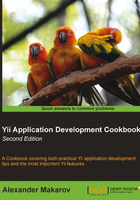
Reusing views with partials
Yii supports partials, so if you have a block without much logic that you want to reuse or want to implement e-mail templates, partials are the right way to go about this.
Getting ready
- Set up a new application using
yiic webapp. - Create
WebsiteControlleras follows:class WebsiteController extends CController { function actionIndex() { $this->render('index'); } } - Set up a database using the following SQL:
CREATE TABLE `user` ( `id` int(10) unsigned NOT NULL auto_increment, `name` varchar(200) NOT NULL, `email` varchar(200) NOT NULL, PRIMARY KEY (`id`) );
- Use Gii to generate the
Usermodel. - Add some data to the
usertable.
How to do it...
We will start with a reusable block. For example, we need to embed a YouTube video on several website pages. Let's implement a reusable template for it.
- Create a view file named
protected/views/common/youtube.phpand paste an embed code from YouTube. You will get something like the following:<object width="480" height="385"><param name="movie" value="http://www.youtube.com/v/S6u7ylr0zIg?fs=1 "></param><param name="allowFullScreen" value="true"></param><param name="allowscriptaccess" value="always"></param><embed src="http://www.youtube.com/v/S6u7ylr0zIg?fs=1" type="application/x-shockwave-flash" allowscriptaccess="always" allowfullscreen="true" width="480" height="385"></embed></object>
- Now, we need to make it reusable. We want to be able to set the video ID, width, and height. Let's make the width and height optional, as follows:
<object width="<?php echo!empty($width) ? $width : 480?>" height="<?php echo!empty($height) ? $height: 385?>"><param name="movie" value="http://www.youtube.com/v/<?php echo $id?>?fs=1 "></param><param name="allowFullScreen" value="true"></param><param name="allowscriptaccess" value="always"></param><embed src="http://www.youtube.com/v/<?php echo $id?>?fs=1" type="application/x-shockwave-flash" allowscriptaccess="always" allowfullscreen="true" width="<?php echo !empty($width) ? $width : 480?>" height="<?php echo !empty($height) ? $height: 385?>"></embed></object>
- Now, you can use it in your
protected/views/site/index.phpfile like this:<?php $this->renderPartial('//common/youtube', array( 'id' => '8Rp-CaIKvQs', // you can get this id by simply looking at video URL 'width' => 320, 'height' => 256, ))?>Looks better, right? Note that we have used
//to reference a view. This means that Yii will look for a view starting fromprotected/views, not taking the controller name into account. - Now, let's send some e-mails. As we are unable to write unique letters to thousands of users, we will use a template but will make it customized. Let's add a new method to
protected/controllers/SiteController.phpas follows:class SiteController extends CController { public function actionSendmails() { $users = User::model()->findAll(); foreach($users as $user) { $this->sendEmail('welcome', $user->email, 'Welcome to the website!', array('user' => $user)); } echo 'Emails were sent.'; } function sendEmail($template, $to, $subject, $data) { mail($to, $subject, $this->renderPartial('//email/'.$template, $data, true)); } } - Here is our template,
protected/views/email/welcome.php:Hello <?php echo $user->name?>, Welcome to the website! You can go check our new videos section. There are funny raccoons. Yours, Website team.
- That's it. In order to test it, go to
/index.php?r=site/sendmails. Note that you need to configure PHP to be able to send e-mails. Instead you can just echo the result without actually sending it.
How it works...
CController::renderPartial does the same template processing as CController::render, except the former does not use layout. As we can access the current controller in a view using $this, we can use its renderPartial to use a view within another view. renderPartial is also useful when dealing with AJAX as you don't need the layout rendered in this case.
There's more…
For further information, refer to the following URL:
http://www.yiiframework.com/doc/api/CController/#renderPartial-detail
See also
- The Using the controller context in a view recipe